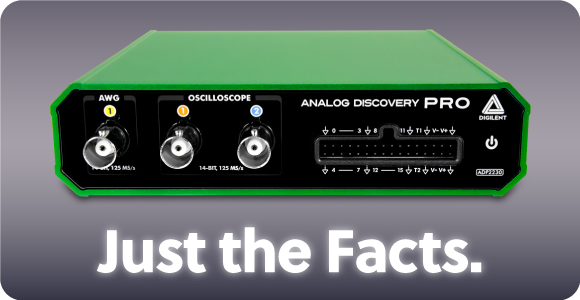A blog post on the hardware features of the Analog Discovery Pro 2230 in less than 250 words for those of you who appreciate maximum utility in a minimum footprint.
- MSRP $749 USD
- Deep buffer memory – On board DDR memory to capture and hold over 100 million samples per input channel directly on the device.
- USB Type-C and 3.0 speeds. Satisfy your data hoarding desire by recording a 16-bit input at 125 MHz until your hard drive is full. There’s no judgment here.
- A pair of 14-bit BNC analog inputs with 50 MHz bandwidth. No, I don’t know what the “30” in 2230 stands for either.
- Hardware IIR and FIR filters for your analog inputs.
- Internally loop the filtered or raw analog input data directly to the analog output and vice-versa.
- A 14-bit BNC Analog output with 15 MHz bandwidth.
- 16 digital I/O pins to generate and analyze a wide variety of communication protocols.
- Two programmable power supplies with 3 Watt output each. If your application isn’t too power hungry, you can even use the supplies with just the potent USB Type-C connection and without the included external power supply in the ADP2230 kit. Nice!
- Integrated readback of temperature, output voltages, and total current used by the device.
- Adjustable system clock frequency from 50 MHz to 125 MHz.
- Two dedicated triggers for advanced triggering, external clocking, and Dual Mode.
- A sturdy aluminum case to put your (hopefully empty) coffee cup on.
Shop the Analog Discovery Pro 2230 here: Analog Discovery Pro ADP2230: Mixed Signal USB Oscilloscope, Waveform Generator, Logic Analyzer, and Variable Power Supply – Digilent



Still no replacement for the actually useful programmable power supplies _with current limiting and metering_ on the Electronics Explorer. Sad… you know how many testing scenarios would benefit from that?
Also, no true differential oscilloscope channels. Is it even an AD at this point?
Combine the IO of the AD2/3 with the supplies from the Electronics Explorer board, and I’ll buy 5 (because you’ll discontinue it, and I don’t want to hoard the single remaining one I have like it’s a pile of gold). It will cover basically all medium-density PCB testing applications without having to roll my own current amplifiers and limited power supplies on the expansion board.